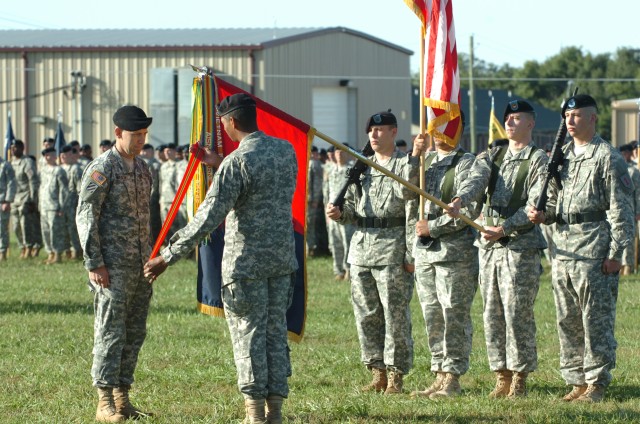
FORT RILEY, Kan. - Change is something that all Soldiers experience in the military, but rarely on the scale that occurred Sept. 22 at Fort Riley's Custer Hill Parade Field, as 1st Brigade, 1st Infantry Division, transformed into the 1st Heavy Brigade Combat Team, facing a new mission.
From November 2006 to September 2009, 1st HBCT had been training transition teams made up of Soldiers, Airmen and Sailors to advise security forces in Iraq and Afghanistan in various combat skills. However, after three years of teaching, 1st HBCT has been turned back into a combat unit, ready to train and deploy to a war zone.
"What we're doing now is changing this organization back into a combat unit which will be prepared to go to Iraq or Afghanistan and engage the enemy," said Col. Eric Wesley, commander of the newly remissioned 1st HBCT.
Under the watchful eyes of the Soldiers in the brigade, more than 16,000 military personnel and 1,300 teams were trained in everything from intelligence to medical operations before the Army decided to shift the mission to Fort Polk, La.
While transitioning from a training unit back into a combat brigade has its own unique set of problems, Wesley said the Soldiers in the unit were able to overcome the obstacles in order to get the job done, and are now eager to undertake this new mission.
"The overlapping missions tended to pull a little bit on our resources, but I think we've been able to finish strong with training the TTs, and are now prepared to accelerate right into the training associated with a heavy brigade combat team," he said.
Some of the benefits of training others for battle are that the lessons being taught have an impact on both the teachers and students, as they can become integrated and used by both.
"Having been training those teams that embed with foreign security forces for the last three years has created a culture within the brigade that understands those tactics and techniques we will use ourselves when we are called upon to deploy," Wesley said.
The new mission of 1st HBCT also affects local communities, as the number of Soldiers within the brigade will jump from about 800 to 3,500.
"This will have a significant economic and social impact for both Junction City and Manhattan as we continue to grow, but I believe that the strong connections we have in the community will help make this transition smooth for all of us," Wesley said.
Both Soldiers and their leaders are now looking forward to the future of the brigade and the mission they have been entrusted with, he added.
"I think what you'll see is a spring in the step of every Soldier here, and the reason I say that is not because they didn't have a love for their prior mission, but every Soldier that comes into an organization like this, he seeks the essence of the role of that Soldier," Wesley said. "That means being able to train and deploy in order to defend this country.
"And now going through this transition, these Soldiers will be at the leading edge of that ability and that capacity, so they're looking forward to coming back online with the rest of the division."

Social Sharing